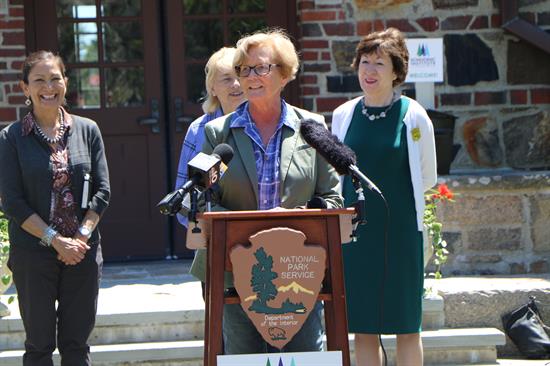Press Releases
Pingree Votes to Clean Up Forever Chemicals1st District Congresswoman is a Longtime Proponent of Legislation to Regulate PFAS Chemicals
Washington,
July 21, 2021
A longtime champion of cleaning up PFAS chemicals, Congresswoman Chellie Pingree today cast a vote to pass the PFAS Action Act—comprehensive, bipartisan legislation to protect all Americans and the environment from the harms of forever chemicals (PFAS). The bill will establish a national drinking water standard for select PFAS chemicals, designate two types of PFAS chemicals, PFOA and PFOS, as hazardous substances to allow the Environmental Protection Agency (EPA) to clean up contaminated sites, and provide $200 million annually to assist water utilities and wastewater treatment. “PFAS chemicals are pervasive, dangerous, and they never fully break down—meaning they accumulate in our environment and in our bodies. It’s estimated that just about every American has PFAS in their system,” said Pingree, who is an original cosponsor of the legislation. “From our military bases to our drinking water, rain jackets to nonstick pans, PFAS are all around us, but EPA, the US Food and Drug Agency, and the Department of Defense need the resources to address the scope of this problem. I proudly voted for the PFAS Action Act today to fund the cleanup and limit human exposure to these forever chemicals because the health of all Americans is at risk if we don’t act.” Pingree added: “Congress should take a note from my home state of Maine: let’s ban toxic PFAS next so we stop this problem nationwide.” According to EPA, perfluoroalkyl and polyfluoroalkyl substances (PFAS) are synthetic chemicals that for decades were used in nonstick and waterproof coatings in commercial household products. PFAS are found in many other products, including food packaging, household cleaners and fire-fighting foams. PFAS don’t break down in the environment or in the human body, and there is growing evidence that exposure to PFAS can lead to adverse human health effects. According to the Environmental Working Group, 297 military sites across the United States have PFAS contamination and as many as 110 million Americans are drinking PFAS contaminated water. Maine has several known PFAS contamination sites, including the former Brunswick Naval Air Station, the former Loring Air Force Base in Aroostook County, and the Kennebunkport, Kennebunk, and Wells Water District. As Chair of the House Appropriations Subcommittee on the Interior, Environment, and Related Agencies, Congresswoman Pingree has prioritized funding for EPA’s work to clean up and regulate PFAS. She and Senator Susan Collins recently wrote to EPA urging them prioritize PFAS issues in Maine. ###
|

